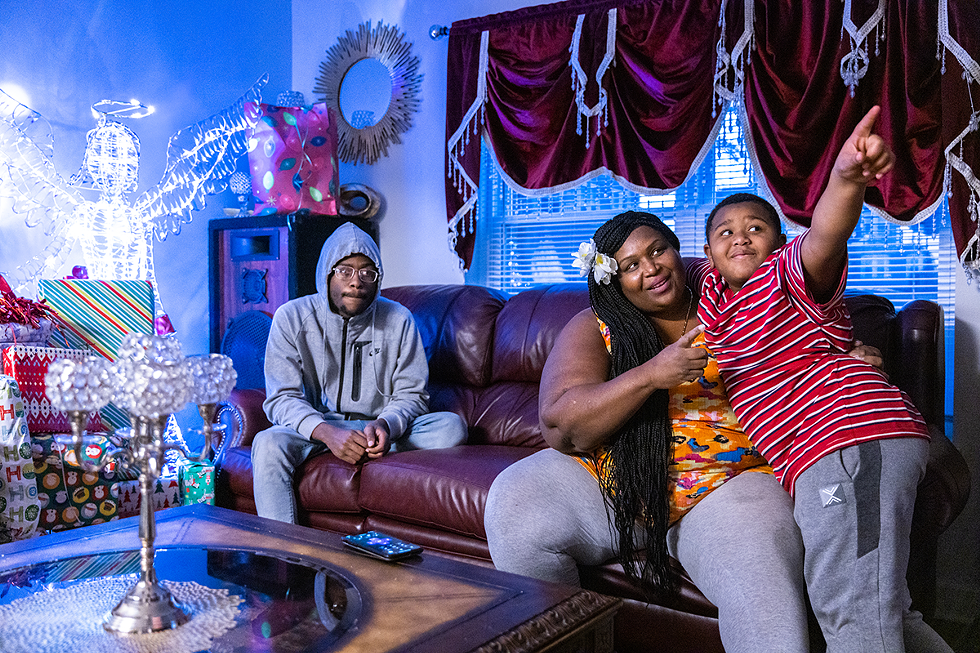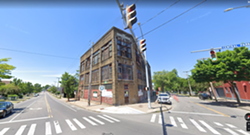
Just before the pandemic, Sparkle, 44, and three of her children were living in a rented apartment on Chili Avenue. “It was rat and mouse infested. There were mouse droppings on hangers. They peed on everything,” Sparkle says. Her asthma worsened, her Afib (atrial fabulation) flared up. The family stayed about a year.
There were few alternatives. Sparkle eventually applied and was accepted into a downtown shelter. She and her children stayed there for about three months. Then they moved to a small apartment on Dodge Street. She didn’t know how long this situation would last. All of this moving around. This is no way to live.

- PHOTO BY MATT BURKHARTT
- Sparkle, 44, in her home with sons Jakai, 17, and Christian, 7.
But it’s the way so many people in Monroe County live every day. They hang on by a thread to any sort of housing option regardless of how shaky. The pandemic was an accelerant. Now, night after night, nearly 900 people find themselves sleeping in shelters or sleeping outdoors with little protection other than a doorway, a car, a bridge underpass.
Sparkle was lucky. While she was in the shelter, she’d been connected with a social

- PHOTO BY MATT BURKHARTT
- Sparkle, 44, in her home with sons Jakai, 17, and Christian, 7.
The type of support PCHO offered Sparkle is only one aspect of its mission. PCHO is unique in that staff actively seeks out those people who might need help. “PCHO was the only group going out on the streets to bring people into housing,” says Nicholas Coulter, who co-founded PCHO in 2015.
And now, the organization is poised to take yet another bold step with the renovation of a historical building in Rochester’s Marketview Heights neighborhood. “We have been relying on other housing resources to provide our housing first model, but now we will provide our own housing with this new development,” Coulter says.
Housing First
PCHO follows the “housing first” model of helping people who are homeless. Housing first is a nationally recognized homeless assistance approach that prioritizes providing permanent housing to people experiencing homelessness.
While there are myriad debates about the causes of homelessness – mental health and addiction issues, poverty, unemployment, lack of affordable housing – there is a growing consensus that getting people housed first can help mitigate other issues.
“Housing is a human right,” Coulter says. “Regardless of your behavior or your financial literacy, everyone has a right to housing. It’s even in the United Nation’s Declaration of Human Rights.”
This year alone, PCHO has served nearly 400 households with its programs, which include homeless outreach, care management, housing, and on-going support services. The organization combines case management with “housing and low-barrier methods. That is, we don’t force people to be on medications or participate in particular programs, but we walk with them. You’re the expert of your life, and we’re just here to walk the path with you. We remove the hoops that people have to jump through to get into housing. People enroll in the programs because they trust us,” Coulter says.
PCHO’s methods have proven successful. “About 82 percent of people we find and work with will leave the streets. About 10 percent of that group goes to a shelter and the other 72 percent go into permanent housing.” In all, Coulter adds, “About 96 percent of the people in our housing first model stay in their homes and take advantage of healthcare.”
The Next Stage: Building Ownership
In 2020, PCHO purchased the empty Polvino Building on Central Park. Built in 1925, the three-story former mixed-use building and furniture warehouse, was run down. PCHO’s plan is to “transform that corner from a dilapidated building into 15 units of permanent rental housing for formerly homeless people,” Coulter says.

- GOOGLE MAPS
- The Polvino Building on Central Park will be transformed into 15 units of permanent rental housing for formerly homeless people.
Home Leasing, a Rochester-based developer, construction, and management company, will manage the property, which is being called Cecilia’s Place.
Slated to cost $6 million, project funding will come from historic tax credits and the Homeless Housing and Assistance Program, Coulter says, explaining that this is a state-funded grant program whereby funding is appropriated from unspent Medicaid funds. “If you provide housing to someone who’s had a long history of mental and physical health issues, you’re actually saving Medicaid dollars by providing them housing versus leaving them out on the street.”
Coulter adds that “the renovation will not be funded through county or city dollars, but since construction costs have risen, we still need to raise $400,000. There is definitely an opportunity for private funding.”
Tenants will pay 30 percent of their income toward rents that will be subsidized by money from the State Office of Temporary Disability Assistance (OTDA), which is also committed to the housing first model.
While Coulter acknowledges that 15 units is but a small bulwark against the incredible need, it’s an important start to get people into permanent housing. The organization hopes this is just the beginning. “PCHO is working on another project with Home Leasing, where we will have 35 units in a building on North Clinton,” Coulter says. Cecilia’s Place is scheduled to open in winter 2023.
But for right now, PCHO continues to find and help people every day. As Sparkle, says, a case worker continues to check in on her and help her when she needs it. PCHO is “good resource. They lead me in the right direction; they’re encouraging.” And as for the new apartment, she says, “I feel like I’m in heaven. No mice. No drama. No discord. There’s peace.”
To learn more or donate to PCHO visit their website.
This content was paid for by Person Centered Housing Options and created by CITY Brand Studio, the brand marketing arm of CITY. The news staff of CITY had no role in this post’s creation.
